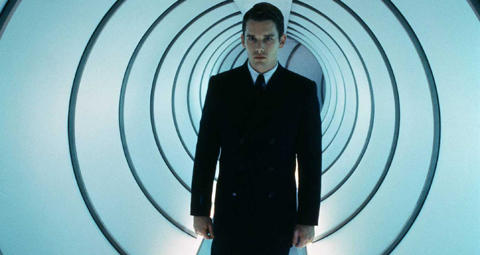October 25 | ![]() 0 COMMENTS
0 COMMENTS ![]() print
print

Sci-fi classic offers a vision of our disturbed future
Emily Black argues that the overlooked Gattaca released twenty one years ago warns of a new wave of eugenics policies
The late and brilliant author Ursula K Le Guin said that science fiction is a place for ‘experiments in imagination’ and the asking of questions. In her writing she argued, and often proved, that the genre enables writers to explore complex sociological and philosophical ideas, and use ‘metaphors for what our language has no words for’ to dissect human nature.
Dystopic science fiction regularly takes an existing, observed issue and transplants it into a futuristic world so that it can be explored from a unique, revealing perspective. These dystopic worlds built by authors and screenwriters paint a bleak picture of how the world could be, and the fears they outline are often in line with the teachings of the Catholic Church, namely the dissolution of the sanctity of human life.
An example of this is Gattaca (1998). Set in a world where eugenics has become the norm, society has been split into ‘valids’ (those with perfected genes) and ‘in-valids’ (those conceived naturally and who are genetically inferior).
Underclass
As Vincent, an in-valid, puts it: “I belonged to a new underclass, no longer determined by social status or the colour of your skin. No, we now have discrimination down to a science.”
In the eyes of the Church, eugenics is utterly immoral and anti-life. It involves experimenting on human life, disposing of unwanted human beings, and meddling with God’s grand natural design for creation.
The horrific moral implications are numerous, and Gattaca investigates the effect this science could have on society. The film treats eugenics as an aberration, exploring the possible, and very believable, detriments it could have.
All in-valids are set up to fail. They can’t pursue prestigious careers and effectively make up a slave labour force for the genetically superior. The genetic test performed at birth, signposting their flaws and predicting their cause of death, hangs over their entire lives like a curse. It is technically illegal to discriminate against in-valids, but everyone does it.
‘In-valid’
Vincent’s parents decided to conceive him naturally, and when he was born his test predicted that he had a 99 per cent chance of dying from a heart condition. During his childhood, they treated him like an in-valid—every cut and scrape a calamity.
They then realise their ‘mistake’ and follow the more socially acceptable option for the second son.
“We want to give your child the best possible start,” the doctor says. The pressure they experience and the way this decision is wrapped up as ‘what’s best,’ is all too similar to what many pregnant couples receive today. In this dystopic world, as in ours, what is ‘best’, i.e. what is expedient or expected, has been conflated with what is morally good.
The couple undergo positive eugenic fertility treatment to conceive their next son, a perfect child they call Anton, after his father.
Contrast
Throughout their childhood together, Vincent’s inferiority and Anton’s genetic prowess form a raw contrast. Vincent needs glasses, he’s shorter, and he always loses at playing ‘Chicken’—a game of who can last the longest swimming out into the ocean.
All Vincent wants is to be an astronaut and work for Gattaca Aerospace Corporation. In this world however, no one needs a résumé anymore: the interview to join the corporation simply consists of a DNA test. If you have superior genes, you qualify for the job.
Vincent is determined not to let his genes get in the way of his dreams. Vincent buys a ‘valid’ identity from Jerome, a former successful swimmer who is now paralysed after walking in front of his car after winning a silver medal: second best, in the world of DNA-engineered perfection, is catastrophe.
Eugenics
Eugenics allowed Jerome to be born almost perfect, and this cursed his life. This is the central irony in the film. Vincent, who was born at a disadvantage, is able to push himself beyond his limitations through pure determination, while a valid succumbs to his flaws.
While this kind of eugenics does not take place today, we can see the beginnings of that kind of society.
The idea that it is acceptable, desirable even, to kill a child in the womb because they have Down’s syndrome, or a cleft pallet, or an undesirable gender, is not so different from the motivations driving eugenics in this film.
Strength
Vincent, with all of the flaws he is born with, is the strongest character in this story, because he does not allow his life to be determined by how society sees his biological imperfections.
As the film climaxes, Vincent and Anton, now grown men, play Chicken once more. Anton starts falling behind and he shouts: “How are you doing this? How are you doing any of this?” He is unable to comprehend how his inferior brother has surpassed him.
Vincent replies: “You want to know how I did it? This is how I did it, Anton: I never saved anything for the swim back.”
Gattaca celebrates the human spirit, pitting pure will and determination against society’s ability to coldly calculate someone’s potential and worth through their DNA. This ‘experiment of imagination’ carries a stark warning for our world today.
In Gattaca, society’s attempts to perfect humanity have limited each individual’s capacity for growth.
The film depicts a society where eugenics has torn the heart out of humanity, creating a society where individuals are subservient to flaws and are unwilling to strive for betterment. It serves as a warning we must heed.










